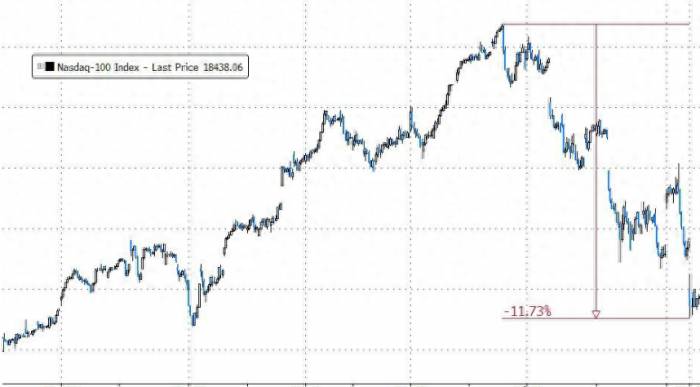This week, the global capital market experienced a "Black Friday."
After the Federal Reserve chose not to cut interest rates on Wednesday, the subsequent release of U.S. economic and employment data fueled investors' pessimistic sentiment: on Thursday, the July ISM manufacturing PMI shrank by the largest margin in eight months, and on Friday, weak July non-farm employment data were announced, with the unemployment rate rising further, marking the worst non-farm performance since the pandemic. This has sharply increased investors' concerns about a U.S. economic recession, with the belief that the Fed's slow rate cuts were a mistake, leading to a large-scale risk-aversion sentiment. Investors from the U.S., Europe, and Japan sold off stocks and flocked to U.S. Treasury bonds, driving U.S. bond yields to plummet.
U.S. stocks plummeted
Following the release of the poor non-farm data on Friday, all three major U.S. stock indices fell, with the S&P 500 closing down 1.84%, the Dow Jones also down 1.51%, and the Nasdaq plunging 2.4%, having accumulated a decline of over 10% from its peak in early July, entering a technical correction range.
Among them, U.S. technology stocks were particularly hard hit, with Intel's stock price plummeting 26% due to poor earnings reports, and all but Apple in the Mag7 saw declines. Amazon's stock price fell 8.8%, following the release of a profit outlook that was below Wall Street expectations. Both Microsoft and Meta fell by 2%.
Advertisement
The market value of the seven tech giants has evaporated an astonishing $2.3 trillion since their peak in early July.
Even small-cap stocks, which had been previously favored, also saw significant declines, with the Russell 2000 index closing down 3.52% on Friday and accumulating a weekly drop of 6.67%.
Over the past month, expectations of interest rate cuts have led to a substantial influx of funds into small-cap stocks, as small businesses can often benefit more from rate cuts when the U.S. economy does not slow down sharply and harm profits. However, the economic outlook has now deteriorated.
Citibank's U.S. stock trading head, Stuart Kaiser, pointed out that these sell-offs reflect typical risk-aversion sentiment, with investors choosing to reduce some positions to hedge against disappointing economic data and corporate earnings pressure.
European and Japanese stock markets preemptively "raced" to decline.As early as the Asian trading session on Friday, the Japanese stock market had already taken the lead in a sharp decline.
Affected by investors' concerns about a recession in the US economy, as well as multiple factors such as the Bank of Japan's interest rate hike and the appreciation of the yen, the Nikkei 225 index closed down nearly 6%, marking the largest single-day drop since 2016. The share prices of Japanese technology companies such as Tokyo Electron, SoftBank, Lasertec, and Advantest fell sharply.
Some analysts pointed out that due to the urgency of highly leveraged Japanese retail investors to sell the popular Nomura NF Nikkei 225 ETF, this pushed the ETF to close down 11.46% on Friday, which is also another important reason for accelerating the collapse of the Japanese stock market.
The Bank of Japan decided to raise interest rates and reduce the scale of government bond purchases at its monetary policy meeting on Wednesday. After the "double-barreled" approach of raising interest rates and shrinking the balance sheet, Bank of Japan Governor Haruhiko Kuroda also stated at a press conference that day that, given the risks of rising inflation, he does not rule out the possibility of raising interest rates again this year.
Affected by this, the yen strengthened, and the appreciation of the yen led to a rapid cooling of expectations that profits of export companies would expand, causing a chill for Japanese exporters.
Bruce Kirk, head of Japanese equity strategy at Goldman Sachs, said: "We believe that the story of Japan's stock market has not been shattered, but the rules of the game have definitely changed."
As the European trading session began, European stocks also collapsed, with the European blue-chip stock index Euro Stoxx 600 falling 2.7% on Friday.

Priya Misra, portfolio manager at J.P. Morgan Asset Management, believes that investors are taking measures to cope with the risk of the Federal Reserve lowering interest rates too slowly, and all asset classes should reflect this. After all, the market is forward-looking, and some people have begun to realize the danger of the US economy potentially falling into a recession.
Market risk aversion has surged dramatically.
Under the circumstances of the US, European, and Japanese stock markets being in turmoil, the VIX fear index closed up 26.04% on Friday, at 23.43, and it approached the 30 mark during the night trading session, reaching the highest level since the banking crisis in March last year.Amid a strong risk-aversion sentiment, investors flocked to U.S. Treasury bonds, with ETFs tracking U.S. Treasuries surging by 6% this week. Investors are betting that the Federal Reserve will be forced to respond to economic weakness by implementing significant interest rate cuts, which has also driven U.S. Treasury yields sharply lower. The yield on the 2-year U.S. Treasury note, sensitive to interest rate movements, plummeted by 30 basis points, while the yield on the 10-year U.S. Treasury note also fell by 18 basis points, both reaching their lowest levels since December of last year.
Steven Blitz, Chief Economist at TS Lombard, stated that the Federal Reserve's decision on Wednesday not to cut interest rates has proven to be a mistake.
Investors are currently anticipating that the Federal Reserve will lower interest rates by 100 basis points before the end of this year, which implies that the Fed will likely implement a rate cut of at least 50 basis points in one of the remaining three meetings this year.
Rick Rieder, Global Chief Investment Officer of Fixed Income at BlackRock, said, "It is expected that the Federal Reserve may have to cut rates by 50 basis points in September because economically sensitive sectors are taking a hit, such as small businesses and low-income consumers."